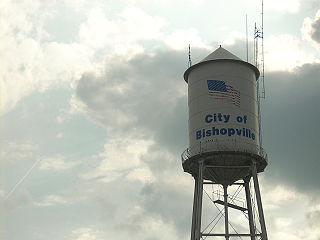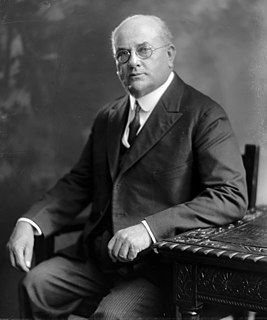Bishopville may refer to a location in the United States:
- Bishopville, Maryland, an unincorporated place
- Bishopville, South Carolina, a town
- The Bishopville meteorite of 1843 (see Meteorite falls)
Bishopville may refer to a location in the United States:

A meteorite is a solid piece of debris from an object, such as a comet, asteroid, or meteoroid, that originates in outer space and survives its passage through the atmosphere to reach the surface of a planet or moon. When the original object enters the atmosphere, various factors such as friction, pressure, and chemical interactions with the atmospheric gases cause it to heat up and radiate energy. It then becomes a meteor and forms a fireball, also known as a shooting star; astronomers call the brightest examples "bolides". Once it settles on the larger body's surface, the meteor becomes a meteorite. Meteorites vary greatly in size. For geologists, a bolide is a meteorite large enough to create an impact crater.

Bishopville is a town in Lee County, South Carolina, United States. The population was 3,471 at the 2010 census. It is the county seat of Lee County.
Robert E. Lee High School may refer to:

Iron meteorites, also known as siderites, or ferrous meteorites, are a type of meteorite that consist overwhelmingly of an iron–nickel alloy known as meteoric iron that usually consists of two mineral phases: kamacite and taenite. Most iron meteorites originate from cores of planetesimals, with the exception of the IIE iron meteorite group

The L type ordinary chondrites are the second most common group of meteorites, accounting for approximately 35% of all those catalogued, and 40% of the ordinary chondrites. The ordinary chondrites are thought to have originated from three parent asteroids, with the fragments making up the H chondrite, L chondrite and LL chondrite groups respectively.

A meteorite fall, also called an observed fall, is a meteorite collected after its fall from outer space was observed by people or automated devices. Any other meteorite is called a "find". There are more than 1,100 documented falls listed in widely used databases, most of which have specimens in modern collections. As of August 2021, the Meteoritical Bulletin Database had 1211 confirmed falls.

Thomas Gordon McLeod was an American attorney and the 95th Governor of South Carolina from 1923 to 1927.
Kediri can refer to:
Lee County Courthouse may refer to:
Find or FIND or Finding may refer to:
Bishopville is an unincorporated community and census-designated place 10 miles (16 km) north of Berlin in Worcester County, Maryland, United States. The community is just south of the Delaware state line. It is part of the Salisbury, Maryland-Delaware Metropolitan Statistical Area. As of the 2010 census, Bishopville had a population of 531.
The St. Martin River is a tributary of Isle of Wight Bay in Worcester County, Maryland. Approximately 4.4 miles (7.1 km) long, it drains the northernmost part of Worcester County.
Spencer House may refer to:

Buzzard Coulee is the collective name of the meteorites fallen on November 20, 2008 over Saskatchewan, Canada.
Bishopville is an unincorporated community in Morgan County and Athens County, Ohio, United States. Bishopville is located on Ohio State Route 78, 2 miles (3.2 km) east of Glouster. Bishopville is located near Burr Oak State Park.
Will Rogers House or William Rogers House may refer to:
In meteoritics, a parent body is the celestial body from which originates a meteorite or a class of meteorites.
Lee Academy can refer to more than one educational institution in the United States:
Meteorite is a solid piece of debris from an object that originates in outer space and survives its passage through the atmosphere to impact with the surface of a planet or moon.